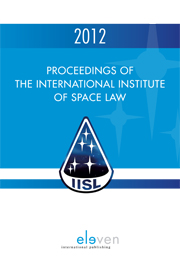|
The purpose of my thesis is to evaluate how Japan has been enhancing the practice of non-functional space object registration utilizing the Space Situational Awareness (SSA) data, and to analyse how Japan has tried to align with principles of international space law to harmonize with the practice of other states capable of launching space vehicles. This practice should be significant today, taking into consideration that the attribution of a space object has important legal effect in terms of liability since the demonstration mission of active debris removal (ADR) and on-orbit service (OOS) will occur soon, which may have a negative impact to space objects which could be under jurisdiction and/or control of other nations. My thesis also covers the possible solution for the current challenges mentioned above. The practice of providing expanded registration information is encouraged in the Guideline A.5 of LTS guidelines, but the scope of “expanded registration information” is not clear yet. Like-minded states should start to develop the best practice compendium of “expanded registration” of non-functional space objects in collaboration with UNOOSA. |


International Institute of Space Law
About this journalSubscribe to the email alerts for this journal here to receive notifications when a new issue is at your disposal.
Issue 5, 2023
Expand all abstracts

 Issue 8
Issue 8